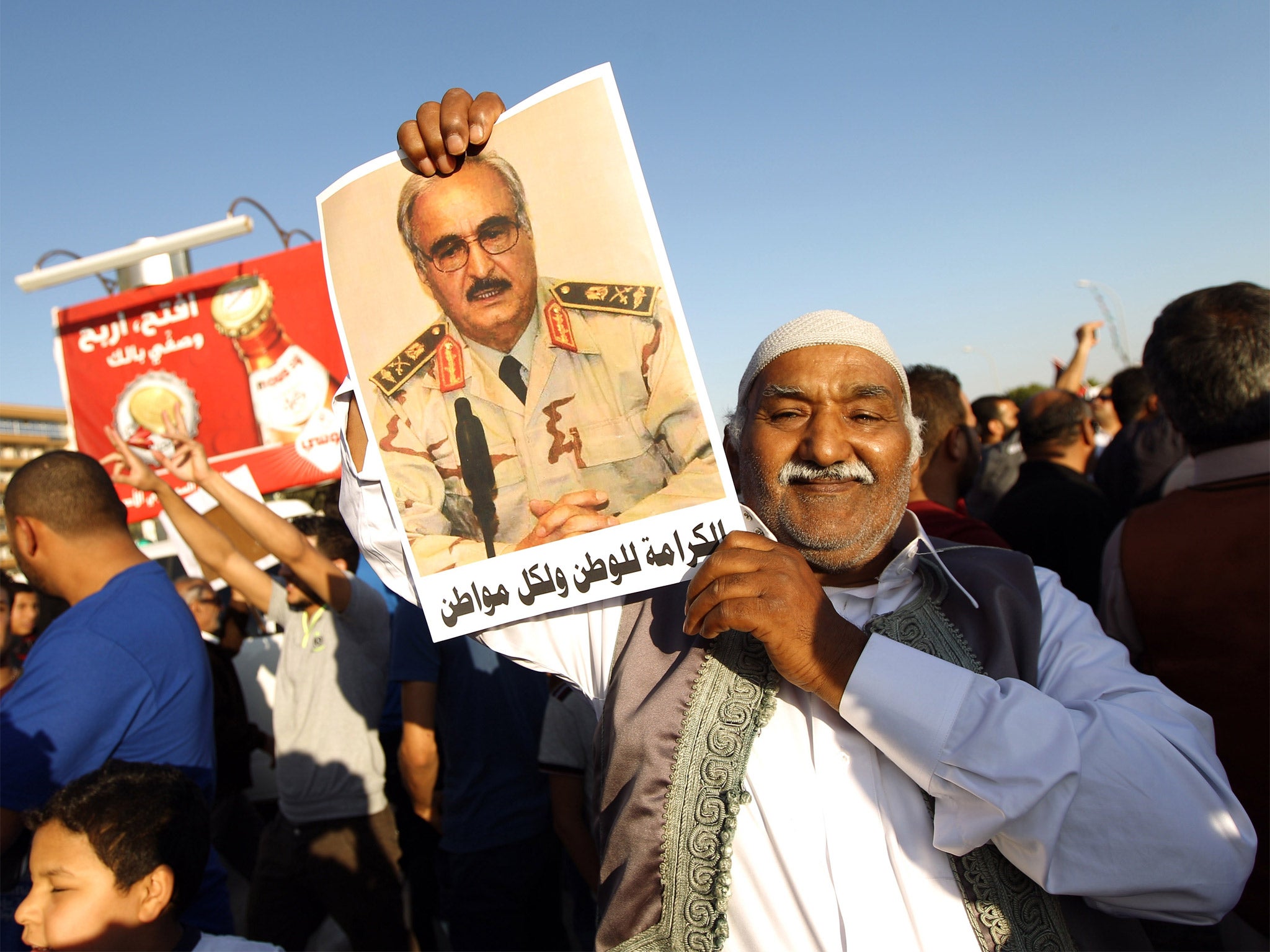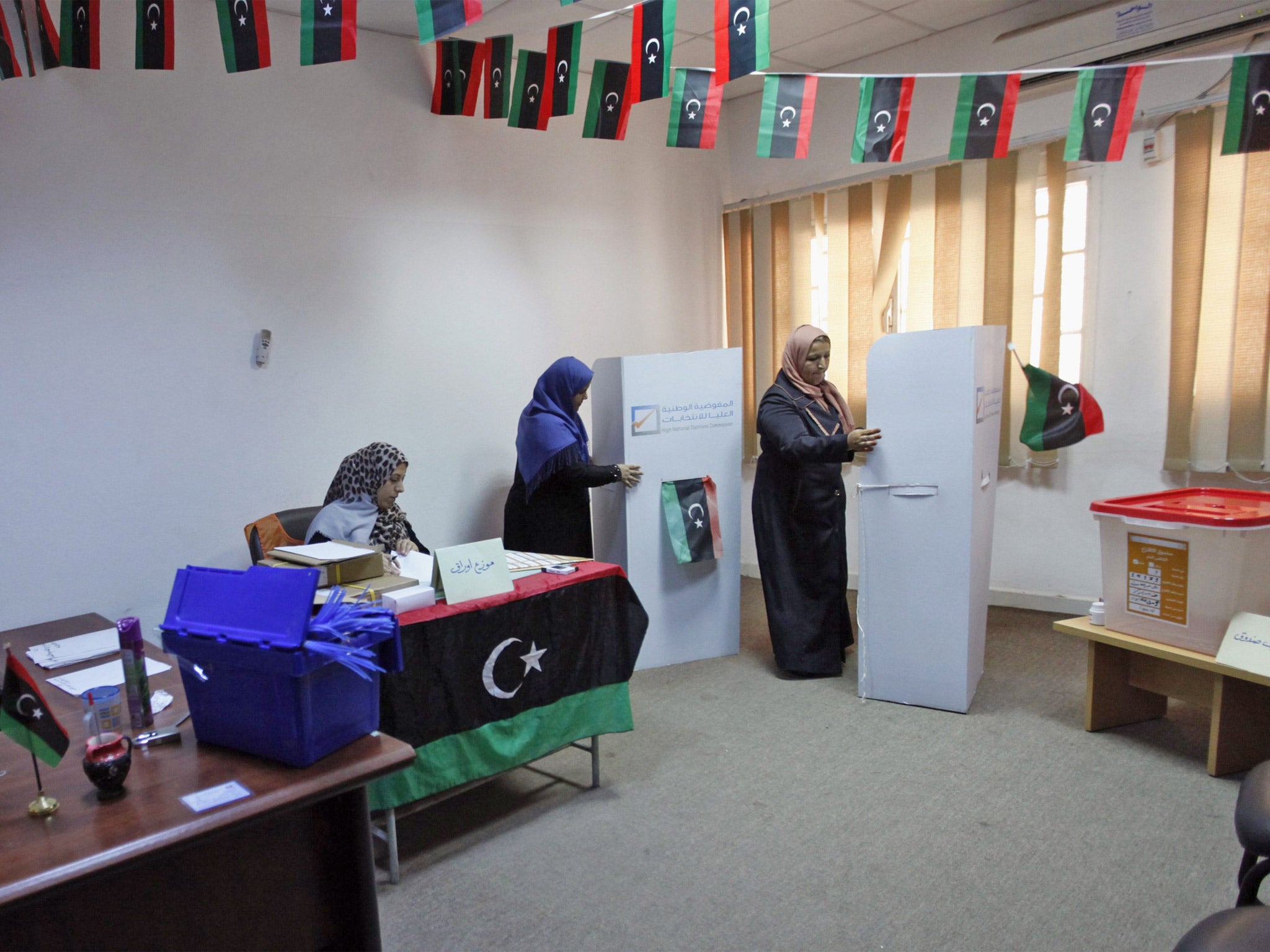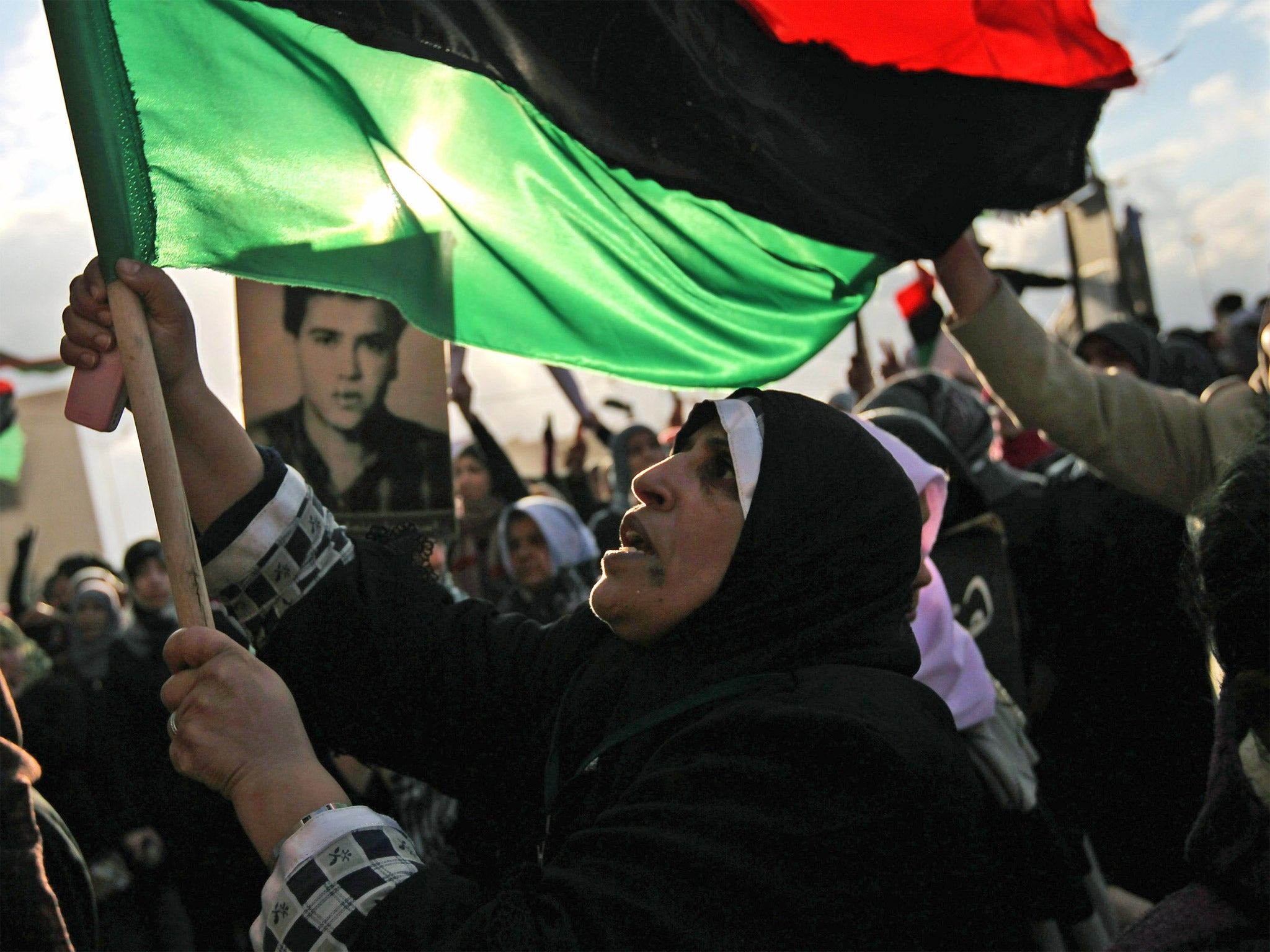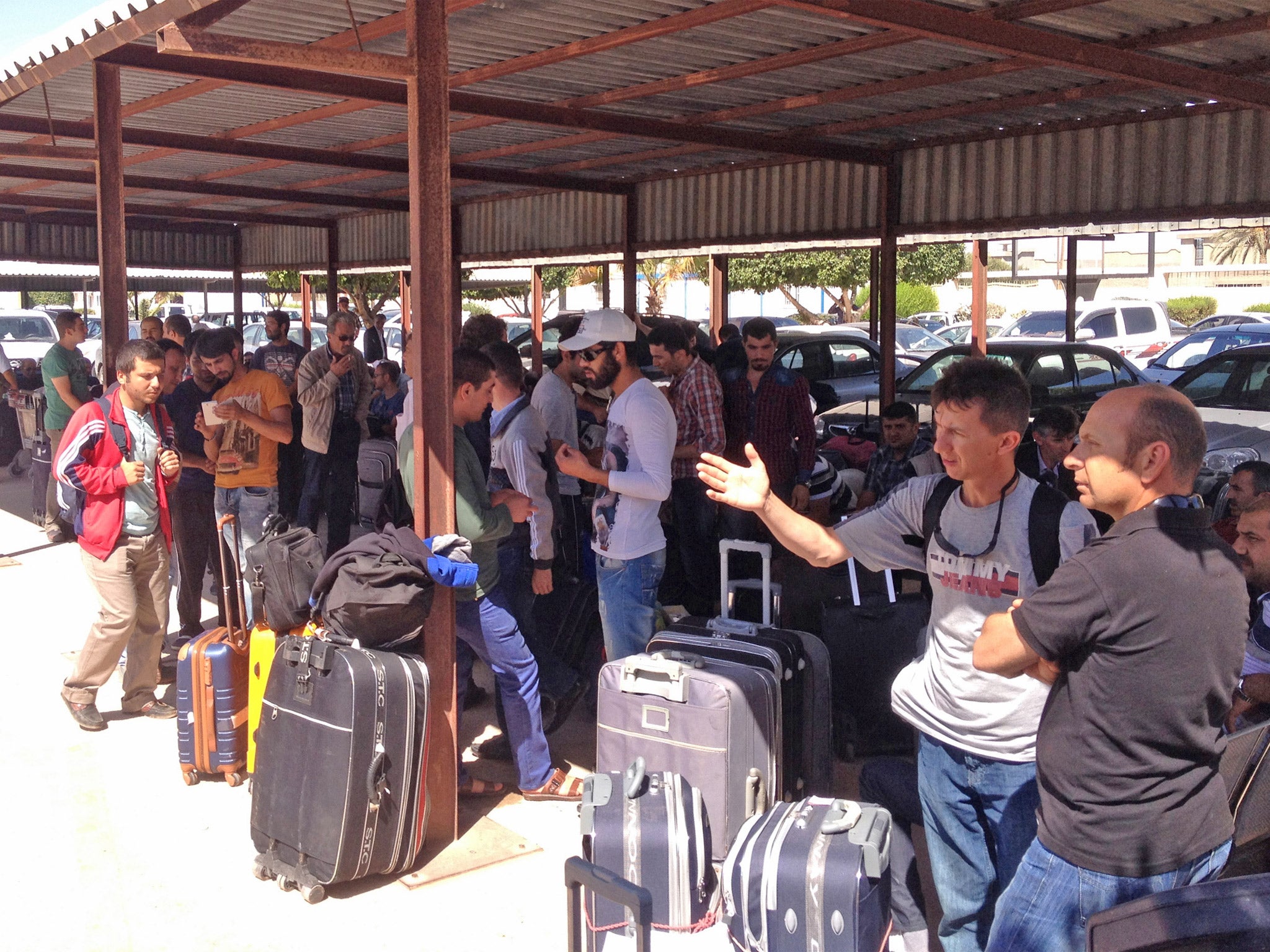Libya elections: Tension as the country heads for the polls in an attempt to end anarchy and conflict
A hastily arranged ballot is taking place in an attempt to tackle the increasingly volatile situation, but few believe that the outcome will bring unity or stability

By the time Ayman Al-Barasa saw the body of Muammar Gaddafi in the meat warehouse in Misrata he had been fighting almost every day for eight months. “I looked at him lying there and just thought, so this was the man who had terrified us for so long. But now he was gone, let there be an end to it. Let’s put all the killings behind us and become one people again.”
On Wednesday Libya is holding hastily organised elections in an attempt to pull the country back from anarchy. But Ayman, who saw his 19-year-old brother, Jawad, killed in one of the final battles for Tripoli, is among many who have little hope that voting will bring the unity and stability the sacrifices of the revolution were supposed to bring.
Libya today is once again torn by conflict, between Islamists and their opponents, between opposing tribes and hundreds of lives have been lost. Libya has an estimated 16 million guns in a population of six million and armed militias have carved up individual fiefdoms. Daily life is a struggle, featuring long power cuts; Libya does not produce enough oil to power electricity plants because of the unrest. Armed guards and anti-aircraft guns guard petrol stations to prevent angry motorists shooting each other. The ballot is supposed to elect a new parliament, which will produce a constitution. But fewer than 1.5 million voters have registered, down from 2.8 million who did so in the first elections after the overthrow of the regime in July 2012. There are half the number of candidates and voters complain candidates are standing as individuals without revealing their party affiliations, despite repeated calls for this to be changed.
The head of the election commission, Emad Al-Sayeh, said: “For sure, we are ready, we have finished the last of the preparations.” He rattled off the statistics: “There are 1,601 polling stations across Libya which are ready. We are going to have 1,628 candidates competing, about 1,000 less than last time, but it’s still good; 32 seats are reserved for women. There has been a problem in organising voters in embassies because of the lack of time, we have only got 10,087 registered abroad.” But some of the voting will take place in regions that remain without any real governance.

Sitting in a café on Tripoli’s corniche, 29-year-old Ayman and three friends, all former rebel fighters, were reflecting on the struggle to overthrow the regime. “I keep thinking of my brother, he was shot in the head when we had almost won, at Bab al-Aziziya.” The fortress in the capital was where Col Gaddafi had made his last stand in the capital before fleeing into hiding and his eventual terrible death in his home town of Sirte.
“My mother cries over Jawad every day, of course we don’t want other families to suffer. But we know there is a great danger now of civil war, there are two sides who hate each other, we know some of them from the revolution, those for the General and those against him, the jihadists.”
The General is Khalifa Haftar, who is either another Gaddafi in the making or the saviour of the nation, according to opposing sides. He is leading a force, with armour and warplanes, in “Operation Dignity”, aimed at Islamist “terrorists” and those he accuses of backing them, vowing to confront the enemy wherever they are. His targets have also included the national parliament which his forces set alight in an attack.
Major General Haftar defected from Col Gaddafi’s forces and lived in exile in the US before joining the rebels, a background used against him by his opponents to charge him with being a regime lackey turned CIA spy. The commander hints that he enjoys Western support: “We are fighting the same enemy as the Americans. It is natural that they would approve of the Libyan peoples’ war against these terrorists. This is also something happening across this region with other countries,” he said.
The General is said to see himself as a man of destiny, another Abdel Fattah al-Sisi, the former army chief recently elected President in next door Egypt after deposing the Muslim Brotherhood government of Mohamed Morsi. The new Egyptian leader, says Haftar, was “the right person at the right place”.

Gen Haftar’s religious opponents denounce him virulently. To the Islamist Ansar al-Shari’ah he is “an apostate who should be executed”. Grand Mufti Al-Sadiq al-Ghiryani has issued a fatwa and called on true believers to join in the fight against “the renegade”.
The Islamists, Gen Haftar holds, have no electoral support and he has been prepared to scale down his operations against them in the run-up to the polls, but “if the terrorists exploit this, we will have to act, we know we’ll have to continue with this war and our capabilities are far superior to the enemies”.
Would Ayman and his friends foresee taking up arms again? “We will defend our country against the jihadists if necessary. Democracy is not yet working properly, but we are much better off than under Gaddafi,” said Mohammed Ahmed Zaied, an engineer. “We are not prepared to suffer again, this time under the jihadists. We are not without weapons.” What weapons did he have? “Nothing much, two AKs (AK-47 Kalashnikovs) and this”, he held a Beretta Storm pistol. “A man would be truly foolish to give away his guns at such a time.”
Meanwhile, Turkey evacuated hundreds of its citizens from Libya after a spokesman for General Haftar warned Qataris and Turks to leave eastern Libya or face consequences. Col Mohammed Hegazy told reporters in Benghazi that citizens of the two countries have 48 hours to leave, warning that unspecified measures will be taken against those who are found after the ultimatum, which he said started Saturday. “We will not be responsible for any backlash against them from the public if they are still present after that.”

Hegazy said the public is angered by the policies of Turkey and Qatar and accused the countries of sending spies to eastern Libya. Qatar and Turkey are seen as supporters of the Muslim Brotherhood.
Timeline: From Gaddafi to anarchy
February 2011 Col Muammar Gaddafi insists that he will not quit after the start of protests.
August 2011 Rebels swarm into Col Gaddafi’s fortress compound in Tripoli, six months after the uprising began.
20 October 2011 Col Gaddafi is captured and killed.
August 2012 The transitional government hands power to the General National Congress, which was elected in July.
September 2012 US ambassador and three other Americans are killed when armed men storm the consulate in Benghazi.
November 2012 New government led by Ali Zeidan is sworn in.
January 2013 Libya dismisses security concerns that prompt Britain, Germany and the Netherlands to urge their citizens to leave the country’s second city, Benghazi.
August 2013 Rebels begin months-long blockade of oil terminals.
November 2013 Nine people killed in clashes between the army and the Ansar al-Sharia armed Islamists in Benghazi.
February 2014 Protests erupt in response to the GNC’s refusal to disband itself after its mandate officially expires.
March 2014 The GNC sacks Prime Minister Ali Zeidan after a tanker laden with oil from a rebel-held port breaks through a Libyan navy blockade. After a brief interim, the GNC elects businessman Ahmed Maiteg as Prime Minister in heated scenes.
May 2014 Government schedules parliamentary elections for 25 June. “Libyan National Army” renegade General Khalifa Haftar attempts to seize parliament building, accusing Prime Minister Maiteg of being in thrall to Islamic groups.
Join our commenting forum
Join thought-provoking conversations, follow other Independent readers and see their replies
0Comments